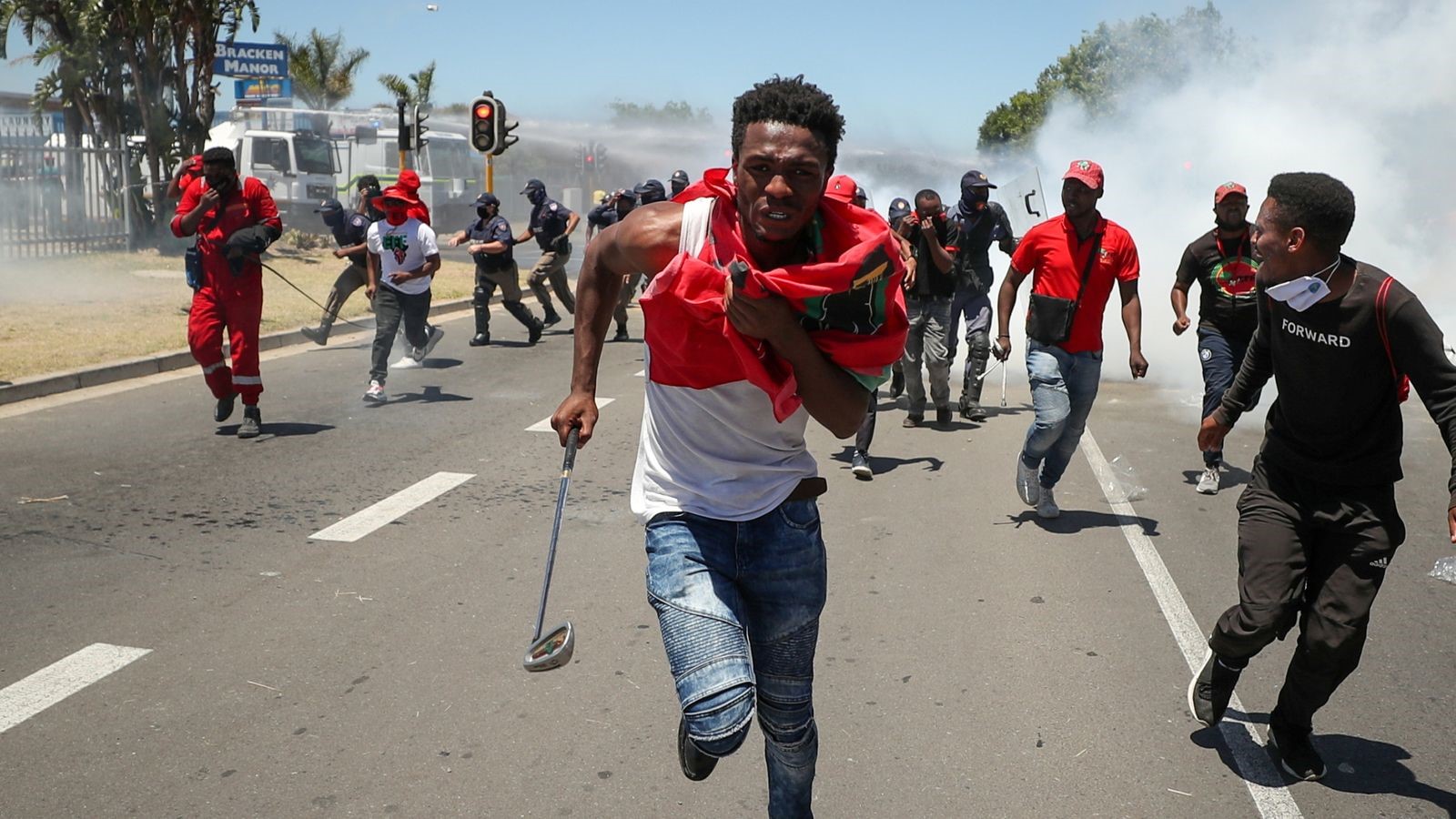
A little over 30 years ago, on 30 June 1991, the South African parliament repealed the inhuman Apartheid laws: until that day, blacks were denied the right to vote and political participation, education, access to the most lucrative jobs, and property – all of which forced them to live in immense slums, breeding grounds for despair and crime. The path had been very slow: first the new Constitution of 1983, then the abolition of the racial laws in 1991, and finally, on 10 May 1994, the election to the presidency of Nelson Mandela, symbol of black resistance, just released after 25 years of maximum-security prison[1].
But the country betrayed the dreams and promises of the people. Although today we can see the use of an integrated black majority almost everywhere, in fact the institutions are struggling to get rid of the still omnipresent concept of race, fuelled by the climate of severe economic decline that plunges the poorest into despair. The economy has never really taken off: in the decade following the end of Apartheid, GDP grew by an average of just over 3% per year, before sinking after the global financial crisis of 2008[2].
The following years are catastrophic, especially in terms of increasing social inequality. After 7 July 2021 and the arrest of former president Jacob Zuma for contempt of court[3] (charges of corruption, fraud, racketeering, tax evasion and money laundering relating to a multi-billion dollar arms deal loomed in the background[4]), a spiral of violence and looting broke out, especially in the areas of KwaZulu-Natal (Durban) and Gauteng (Johannesburg), forcing the government to deploy over 20,000 soldiers to quell the riots. In the end, more than 300 people were killed[5], more than 1,200 arrested, more than 40,000 businesses looted[6], clinics, mosques, schools and pharmacies paralysed[7]: the country was plunged into chaos[8].
This is just the straw that breaks the camel’s back: popular anger has been smouldering for some time due to a long series of failures by the ANC (African National Congress) led first by Zuma, thanks to whom only corruption is growing, and then by the current government of Cyril Ramaphosa, which has been able to reverse the trend: 16.3 million people live in absolute poverty on less than 1.9 dollars a day[9], and unemployment is close to 35% of the potentially active population (almost 8 million without work[10]).
The suspicion that the riots are being directed is far from unfounded. The issue is all political, that is, the clash between the majority of the ANC, on the one hand the friends of Zuma and on the other his supporters in a small opposition party, the RET (Radical Economic Transformation[11]), led by Carl Niehaus and Ngrayi Ngwenya, two powerful men suspended by the ANC for their radical positions[12]. The pro-Zuma front has used the arrest of its leader to launch a furious campaign of disinformation[13], fomenting, guiding and financing the uprisings: their ranks include former members of the intelligence community[14], the State Security Agency[15] and various government officials[16], all of whom are engaged in organising the uprisings through an unscrupulous use of social networks[17].
The bitter price of the pandemic
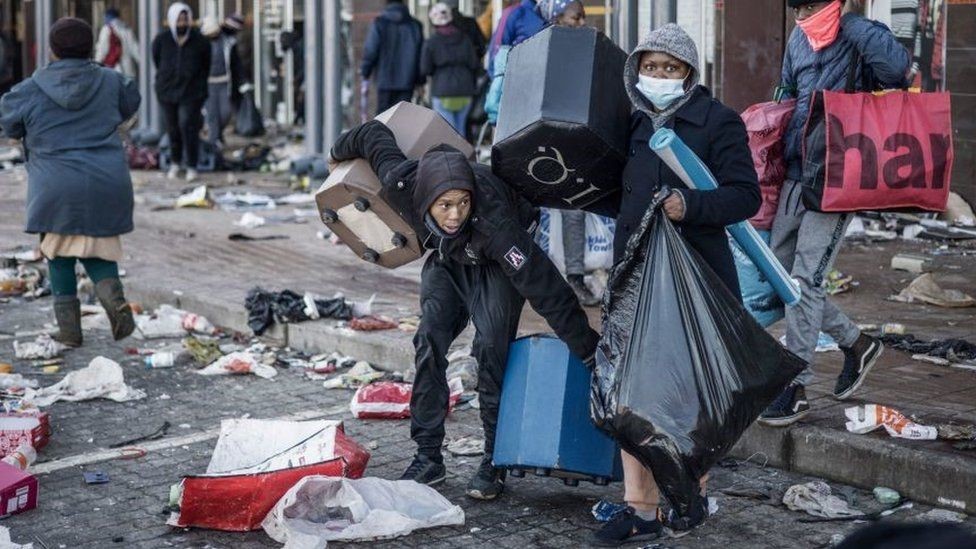
Riots and looting triggered by the arrest of former president Jacob Zuma[18]
The poor management of the pandemic is further fuel for the fire: on 5 March 2020 the first case of infection was reported[19], and by 30 April there were already 5,300 admissions to hospital and at least 100 deaths[20], so much so that the government declared a state of national disaster, activating the Disaster Management Act (DMA), an act that allows the executive to promulgate regulations without the approval of parliament[21]. All measures taken to contain the pandemic will therefore be enacted by decree and without political debate[22].
The pandemic was a tsunami that crashed into already inadequate health structures: the first wave reached its peak on 19 July with 13,499 cases registered in a single day[23], and the government intervened with draconian measures, confining citizens to their homes, which inevitably led to a total paralysis of production and trade, with the consequent worsening of socio-economic conditions, against which a policy of tax relief proved insufficient[24]. The measures increase the budget deficit for the period 2020-2021 from 6.8% of gross domestic product (GDP) to 14.6%[25] .
Among the measures taken by the ANC to stem the spread of the virus, the one with the most damaging effects is the ban on the sale of tobacco and alcohol[26], introduced in March, revoked the following 1 June then reintroduced without notice on 12 July[27] amid protests from opposition parties, first and foremost DA (Democratic Alliance)[28] , but with the support of the radical left-wing EFF (Economic Freedom Fighters) and the party of the Zulu monarchy, the Inkatha Freedom Party (IFP) – all of whom agree that alcoholism and smoking are a problem that needs to be tackled immediately to reduce the number of sick people[29].
According to WHO figures, South Africa is one of the countries with the highest alcohol consumption in the world, with 31% of the population over 15 years old consuming 28.9 litres of pure alcohol – per capita – per year[30]. According to research published by BMC Medicine, around 62,300 adults (2015) die each year from causes attributable to alcohol[31]. According to the government, prohibition will have two positive effects: curbing opportunities for socialising and therefore the spread of the virus, and relieving health facilities of the sick and injured as a result of drunkenness: a high number of admissions are linked to episodes of violence committed while intoxicated, road accidents (according to the WHO, 58% of road deaths in South Africa are due to alcohol[32]) or alcohol-related diseases.
According to research published in the SA Medical Journal (SAMJ)[33] , prohibition measures are achieving tangible results: the number of deaths in motor vehicle accidents, suicides and homicides drops by 50% during the March to May 2020 blockade. Professor Charles Parry, co-author of the research, says the reduction has resulted in between 60% and 70% fewer hospital admissions for alcohol-related injuries and illnesses[34]. This frees up huge health resources to be dedicated to the pandemic emergency.
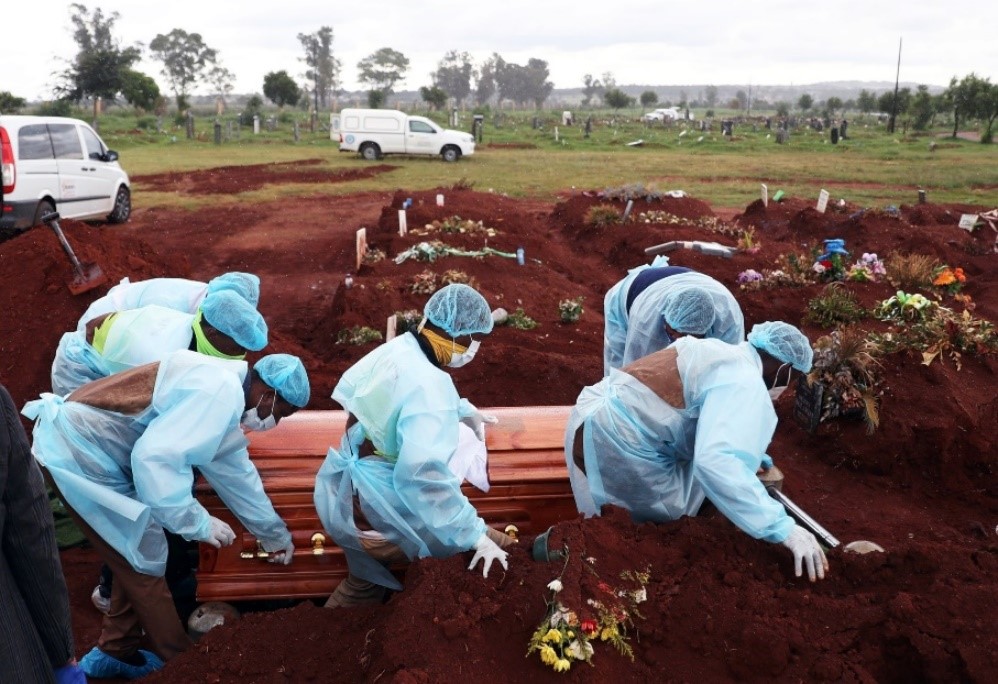
6 January 2021: Funeral workers carry the coffin of a Covid-19 victim to the Olifantsvlei cemetery, southwest of Johannesburg[35]
Alcohol producers and retailers disagree with the analysis. According to their data, the reduction in crime cannot be attributed to prohibition: a study conducted by independent analyst Ian McGorian of Silver Fox Consulting, and Professor Mike Murray of the School of Mathematics, Statistics and Computer Science at the University of KwaZulu-Natal, reveals that very similar figures were seen in countries that did not enforce a lockdown on the circulation of alcohol during the lockdown[36].
In any case, the lockdown and related measures seem to be effective and the number of people affected by the pandemic decreases, so that, one by one, these exceptional measures are lifted[37]. Bans on the sale of alcohol and tobacco are relaxed in August, allowing purchases on specific days and at specific times of the day[38], which leaves the management of preventive measures to citizens with very low health awareness. Right on time comes a second pandemic wave, more serious than the previous one. 8 January 2021 is the day of the highest peak: 21,980 new cases, while the total number of deaths has already risen to 32,425[39].
President Cyril Ramaphosa announced the application of a “modified” blockade until 15 January 2021[40] . The new measure contains a number of measures already adopted previously: a complete ban on the sale and consumption of alcohol in bars and restaurants; distribution and transport are also banned again[41]. Infections fell and the government relaxed the restrictions. Finally, on 17 February, the vaccination campaign began with the administration of the first 80,000 doses of Johnson & Johnson vaccine, in anticipation of the 9 million doses that President Ramaphosa promises for the immediate future[42].
But the action was too late[43], winter was approaching, the public’s lack of attention and the inadequate measures once again set the pace for a new massive spread of the virus[44], and this time the new ‘delta variant’ showed a considerably higher level of transmissibility[45]. The third wave is on its way, and is even more devastating than its predecessors: on 3 July, there was a peak of 23,485 cases per day, and on 13 July, 633 people died[46]. The situation is out of control. The health structures have collapsed[47], ambulance sirens are now a constant background to the daily lives of the citizens[48], as are the uprisings that are being bloodily repressed by the police[49].
The government implements further restrictions: it bans gatherings, closes schools, decrees a curfew from 9 p.m. to 4 a.m. – and reintroduces alcohol and smoking prohibition[50]. The vaccination campaign was slow: in July, only 2.7 million doses had been administered out of a total population of 60 million[51]. We have to wait until the end of September to declare the end of the third wave: the data available (4 November 2021) speak of a total of 89,295 deaths and almost 3 million cases of contagion[52]. And now, while waiting for a possible fourth wave, the government is determined not to be found unprepared and to decide on draconian measures in good time[53].
The hidden vices of prohibitionism
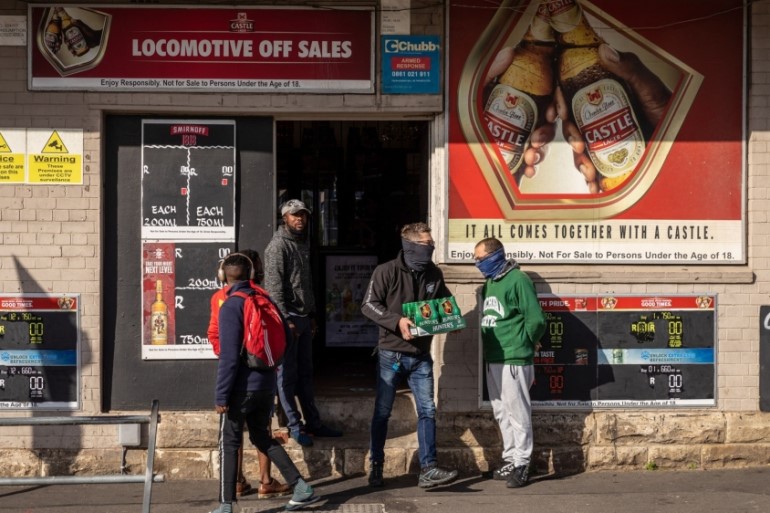
Facing customers illegally buying alcohol in Cape Town during prohibition[54]
The logic stated by the government is unexceptionable: smoking weakens the respiratory system, and in poorer areas people share cigarettes, increasing the risk of spreading the virus[55]. The ban on alcohol consumption significantly reduces the use of health facilities for the effects of drunkenness[56] . The effects of the measures are still being defended by Health Minister Zweli Mkhize[57] . According to research carried out by the School of Economics at the University of Cape Town[58], at least 93% of regular smokers continued to smoke even after the ban, buying tobacco illegally at a price that increased by up to 250%[59]. A major victory for the criminal market.
Things are no different for alcohol. After the first ban, alcohol sales soared: the measure triggered a supply race, and during the blockade there was never a shortage[60] – thanks to a thriving illegal market already in place[61]. In fact, consumption has remained unchanged, but the market has fallen into the hands of smuggling gangs, the quality of the product has fallen and the health risks for consumers have increased[62].
Most of the distribution goes through the same channels: smoke and alcohol are delivered home to the rich and sold from spazas (small emporia, roadside shacks) to the poor[63]. From 27 March 2020 to 27 January 2021, the Western Cape Liquor Authority, the body that monitors and regulates the alcohol market, caught 354 liquor licence holders in the act between 27 March 2020 and 27 January 2021, when they contravened the regulations of the National Disaster Management Act and faced criminal convictions and heavy fines[64].
The spaza, legacy of apartheid
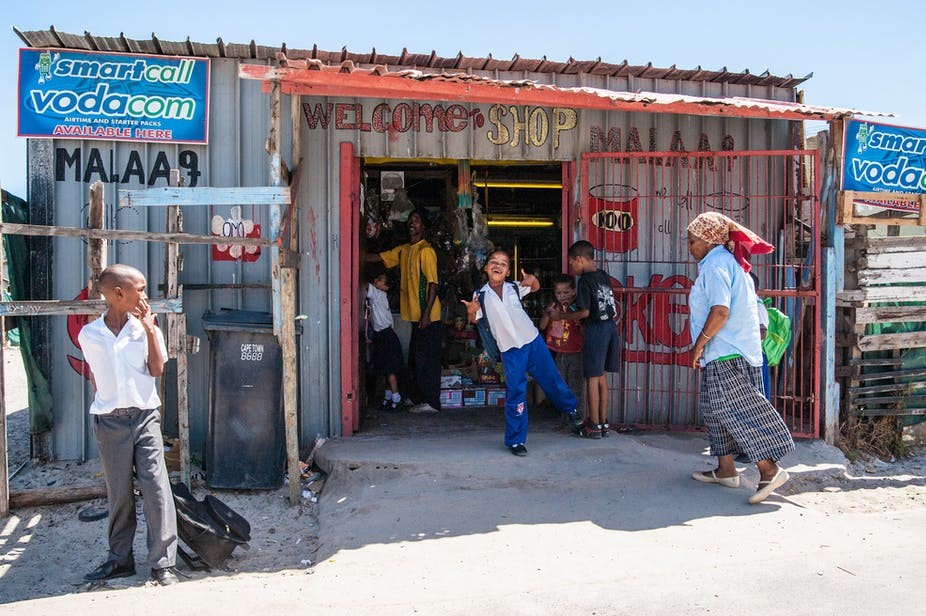
Spaza shops in South Africa are a ubiquitous feature of the urban landscape[65]
The spaza (which means “hidden” in the Zulu language), are small informal shops, more than 100,000 in all of South Africa[66], shacks built into the houses in the townships or built on the access roads to the villages, and originated during the years of apartheid, when blacks were not allowed to run businesses[67]. Now legalised, they are emporiums that sell basic necessities to meet the daily needs of the inhabitants. Run by poor people, they fell into the trap of the illegal market during the blockade, often being blackmailed, and became hubs for drug dealing[68].
Spas offer the advantage of convenient sales outlets in areas where large-scale commercial distribution does not arrive and citizens have no means of transport, are not bound by timetables and use credit to their customers, who are part of a circle of friends and relatives[69]. Prices are usually 30 to 50% higher than those of large retailers, because supplies are made in small quantities, the shopkeepers cannot take advantage of the prices reserved for supermarkets, and they have to pay protection money to local criminals who protect and often supply them[70].
The owners have no commercial training, do not keep accounts, make frequent mistakes when calculating prices and provide poor customer service, all of which leads to waste and very high operating costs[71]. They have enormous difficulties in gaining access to bank credit, because they have no guarantees, they are often victims of robbery (trade is only conducted with cash), they often belong to new ethnic groups of immigrants (Ethiopians, Syrians, Somalis, Pakistanis, Bengalis[72]) and are therefore opposed or mistreated[73]. A very hard life.
Competition is a crucial aspect that has reshaped the spaza network in recent years. It is foreign immigrants who have made life even more difficult for local shopkeepers. First it was the Somalis, then a wave of migrants, mainly from Bangladesh, got the better of the clueless local businessmen[74]. They are seen as a threat to the economy and are frequently subjected to xenophobic attacks, fuelled by political propaganda[75]. Many are forced to turn their spazas into bunkers with bullet-proof glass and protective wire mesh[76].
Especially in the months of the pandemic, an increasing number of trained entrepreneurs have emerged who open such businesses by choice, with real, efficient shops, employing people, having high turnovers, entering into agreements with wholesalers and managing to provide a far better service than the traditional spazas, which are now at risk of extinction due to fierce competition[77].
One thing does not change: the world around the spaza is full of illegality, almost nobody pays taxes or has a legal licence[78], the employees work up to 16 hours a day, 7 days a week[79], without a contract, and the employers withhold their already meagre pay (the average is 400 Rand, or 27.2 dollars a month), they force them to sleep in the shop[80], and nobody says anything, because these immigrants are despised by everyone and ignored by the state[81].
The informal economy of the Spas contributes more than 5.2% of GDP and employs more than 2.6 million people; according to research by Mastercard, there are more than 1.5 million informal businesses in the circuit, generating a turnover of about 75 billion Rand per year[82]. This is despite the fact that business incentives and the government’s extraordinary measures for the costs of the pandemic have literally snubbed the spaza network[83].
Prohibition costs
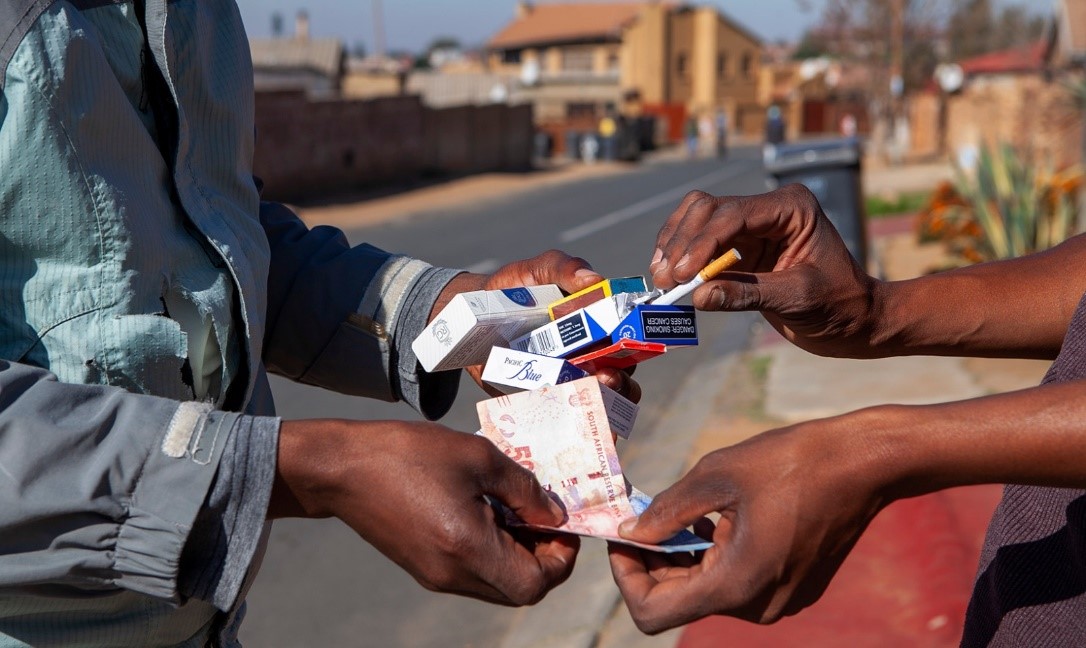
Prohibition moved the tobacco and alcohol market from the legal to the illegal network[84]
The impact of prohibition on the national economy has been considerable. In September 2020, Commissioner Edward Kieswetter of the South African Revenue Service (SARS) stated that, due to the National Disaster Management Act, a large number of industry players had turned to the black market, and that it would take years for a return to a state of normality[85]. Kieswetter himself also denounced the high costs to the exchequer of lost revenues from prohibition: labour taxes fell by 14.5 billion rand ($930 million), while corporate income tax fell by 16 billion rand ($1.03 billion)[86].
Alcohol and tobacco taxes fell by 10 billion rand, VAT losses are 14.5 billion rand, and customs duties are down 16.7 billion rand[87]. If we then add taxes on the individual incomes of the employees of those companies and other taxes on labour, which are calculated at about 15 billion rand, Kieswetter’s calculations reach the frightening figure of 5 billion dollars a year[88], or 1.6% of the gross domestic product[89] and 5.8% of South African tax revenue[90]: a real debacle for an economy already deeply tried after decades of misgovernment and the deadly blow inflicted by the pandemic.
There are also costs that are difficult to estimate, such as the social costs triggered by the loss of jobs for thousands of employees in the sector of foreign commercial distribution companies that have stopped delivering, or of local companies forced to close[91]. Not to mention the damage to the social fabric caused by fuelling the illegal market, which has taken over areas that are very difficult to regain: before the lockdown, smuggling occupied between 25 and 28% of the global market, now it has reached 100%[92].
Cigarette smuggling is very profitable: it costs 2 rand to produce a packet of 20 cigarettes and on the black market it can be resold (tax-free) for up to 25 rand, a very high profit margin[93]. An investigation by anti-corruption group Tax Justice SA (TJSA) reveals that two out of every three cigarettes sold in South Africa are smuggled, making it the largest black market for tobacco in the world[94]. A TJSA researcher visited 43 retail outlets in Cape Town, Johannesburg, Pretoria and Durban and in all but one of them it was possible to buy cigarettes for 20 rand[95], a price that reveals that these are smuggled cigarettes, as a legal packet, between excise and VAT alone, costs 20 rand, so that a packet of Marlboros, on the legal market, sells for 46 rand[96].
The Directorate for Priority Crime Investigation (Hawks) estimates that between April 2017 and March 2018, about 80% of the illegal cigarettes were domestic products, with the rest coming mainly from Zimbabwe[97] and Mozambique [98]. According to the South Africa Tobacco Transformation Alliance (SATT), Zimbabwe, claiming to export tobacco to South Africa, uses South African middlemen to export tobacco elsewhere, for example to China: the middleman receives payment from the Chinese, retains his percentage and pays the rest to the manufacturer[99] . As much as 99.5% of the tobacco exported to China from Zimbabwe between 2014-18 was declared as exported to South Africa[100] .
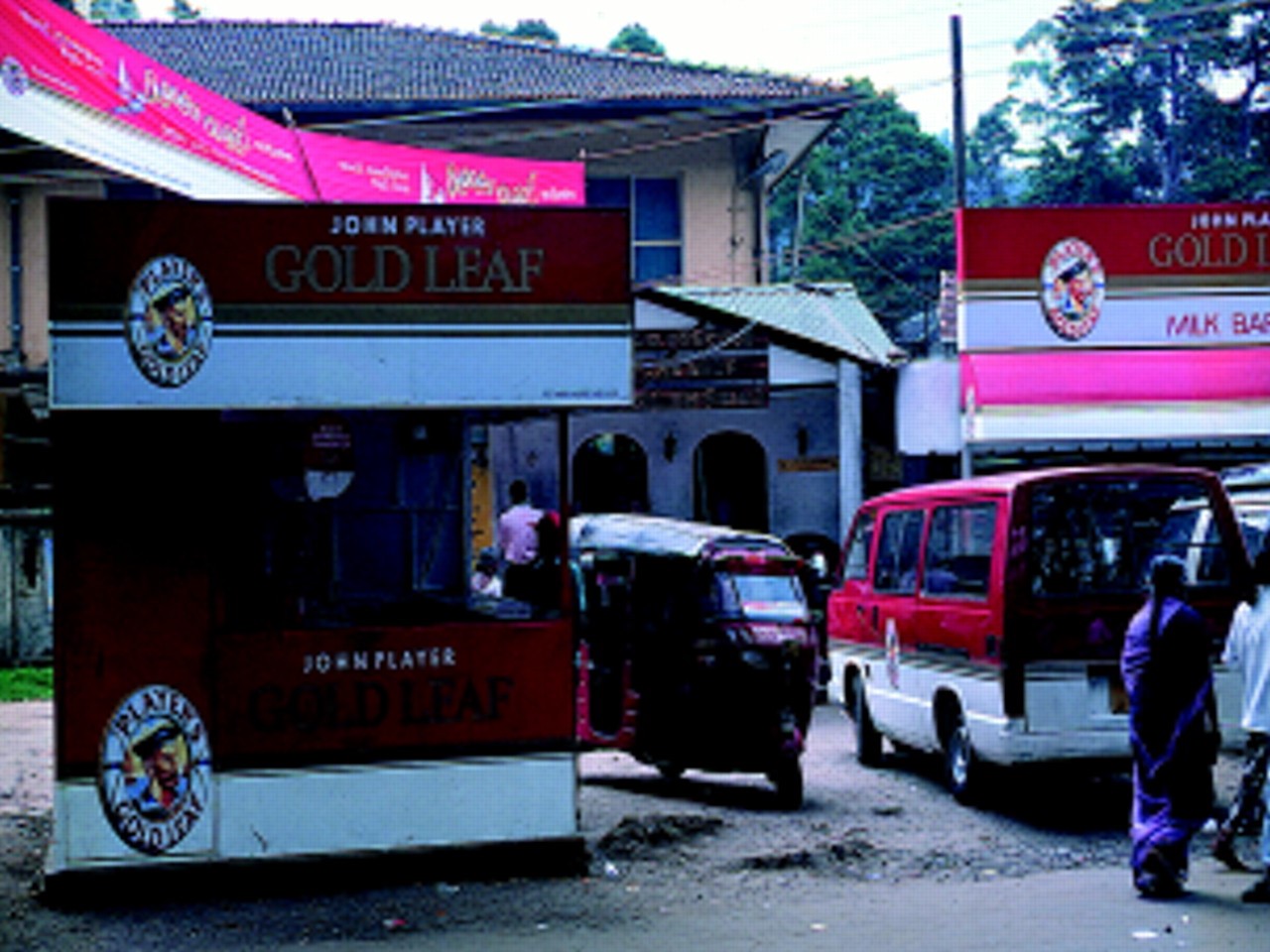
Kiosks selling South African cigarettes even in Pakistan[101]
The best-selling smuggled brand outside South Africa is Pacific Cigarettes, produced by Savanna Tobacco[102], owned by Adam Molai[103], son-in-law of former Zimbabwean President Robert Mugabe[104]. The other black market giant is the Gold Leaf Tobacco Company which, according to TJSA, with its RG brand alone covers a market of 10.7 million rand per day, placing it among the top six illegal brands[105] and which, according to the Tobacco Institute of Southern Africa, represents 75% of the entire national illicit cigarette trade[106].
Cigarettes enter South Africa through two routes: one uses small-scale traffickers called “runners”, who carry bags of cigarettes received from traffickers near the border, cross the border through the bush and travel up the Limpopo River in the middle of the night – there are at least 200 entry points along the border that can be exploited[107]. The soldiers guarding these crossings on both sides of the border are paid not to look[108]. The ‘runners’ then meet up with buyers who drive their lorries through back roads to avoid possible controls.
The other way is to use the official border crossings. Cigarettes used to be hidden in oil tankers exporting petrol imported from South Africa and which, once the fuel was unloaded, would return to South Africa with a load of tobacco, but the use of scanners and increased controls in recent times have made this practice increasingly risky[109]. Buses with hidden compartments are now used, or private cars, which are not usually checked, but the small amount they can carry compared to the high risks involved discourages their use[110].
Why politics likes smuggling
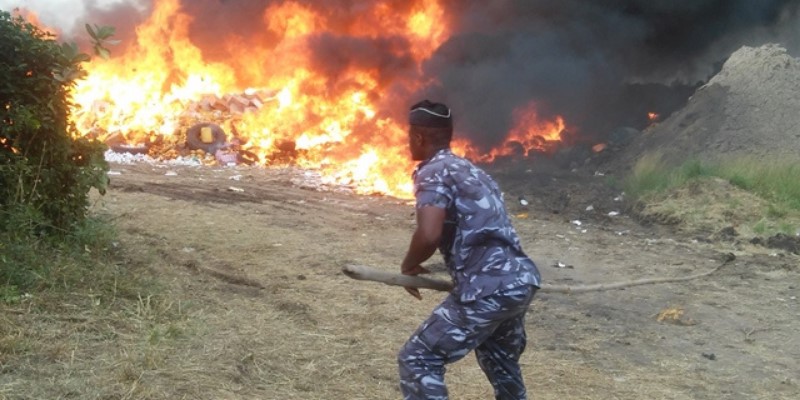
SARS destroys tonnes of tobacco diverted from the illicit market[111]
Although South Africa is a signatory to the WHO’s FTCT Protocol (2013) to eliminate the illicit tobacco trade[112], the government has never shown much willingness or efficiency: the rivers of money produced by the black market also hide a dense network of corruption, money laundering and political collusion[113]. In November 2013, SARS announced that it would prosecute 15 manufacturers and importers for tax evasion (equivalent to 12 billion rand, or USD 1 billion[114]) and illicit trade, including the multinational British American Tobacco (BAT), which also controls 74% of the official market[115], according to the latest Euromonitor report (2016). Eighteen months after the investigation was announced, the head of SARS and 55 other officials were dismissed and the proceedings initiated against the manufacturers were stopped[116].
The black market is a key partner for tobacco producers: it is a convenient alibi for demanding lower excise duties. BAT, like other tobacco companies, is accused of spreading inflated smuggling figures[117]. A joint investigation by the BBC and the University of Bath reveals that BAT[118] allegedly spent around 50 million rand a year running a private intelligence network, ostensibly to combat illicit trade, but in reality to spy on competitors and hamper them commercially[119].
The investigation uncovers an extensive corruption network involving representatives of the State Security Agency, the South African police and the judiciary[120]. In 2013, BAT allegedly paid bribes of between $300,000 and $500,000 to Zimbabwean dictator Robert Mugabe[121] . In 2017, BAT was overwhelmed by an investigation by the UK’s Serious Fraud Office (SFO)[122] . Following revelations in a BBC report that the company had paid bribes to officials in Rwanda, Burundi and the Comoros Islands, the SFO opened a criminal investigation but[123], shortly afterwards, the magistrates in charge dropped the case due to insufficient evidence[124].
Carnilinx (Pty) Ltd, one of the main companies targeted by the espionage network set up by BAT, is a producer of low-cost cigarettes such as Premium, JFK and Atlantic[125]. The company is accused of supporting the illegal market because of the low sales price of its cigarettes, well below the minimum tax rate: the only logical explanation is that Carnilinx evades taxes[126].
The only logical explanation is that Carnilinx is evading tax. Its director, the Italian Adriano Mazzotti, has for years been at the centre of a series of criminal investigations characterised by collusion with politicians[127]. His network of powerful connections is highlighted by numerous events: in 2014, he financed the EFF (Economic Freedom Fighters) with 200,000 rand, the leader Julius Malema being a close personal friend of Mazzotti)[128] . Malema is at the centre of accusations of fraud and corruption[129], then of money laundering[130] and tax evasion[131]. In an affidavit, Mazzotti admits to handing over 820,000 rupees in cash (about $11,000) to a prominent Johannesburg lawyer, to be used to bribe former SARS chief Johann van Loggerenberg and former acting commissioner Ivan Pillay[132] .
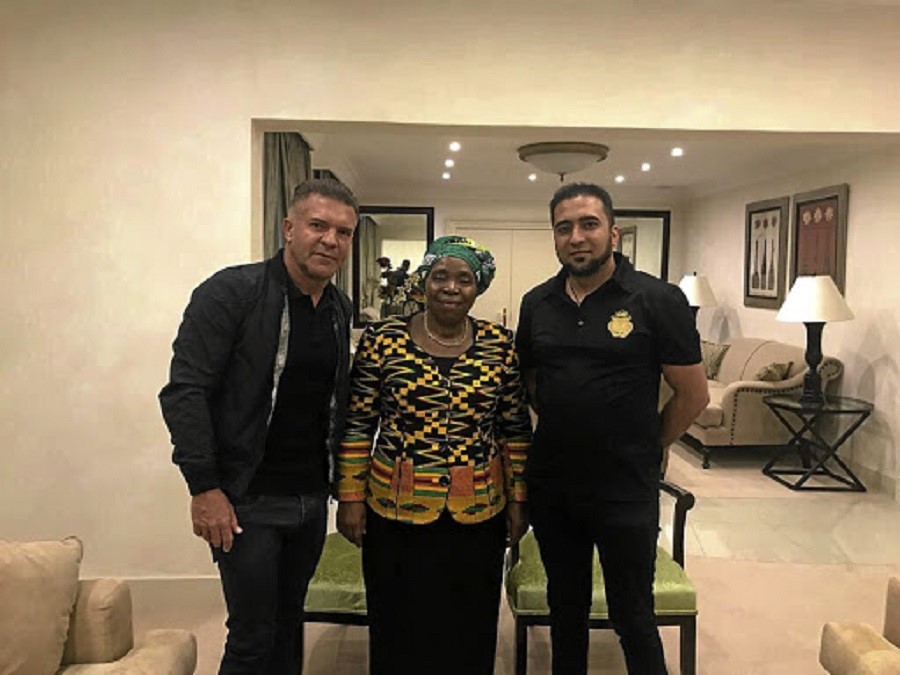
Nkosazana Dlamini-Zuma (wife of former President Jacob Zuma) with Adriano Mazzotti and Mohammadh Sayed, operations manager at Carnilinx Tobacco Company[133]
In 2015, the Sunday Times uncovered a payment of one million rand made by Carnilinx director Kyle Phillips to Malema “to help him pay his taxes”[134]. In the meantime, the EFF leader is living in an estate in Hyde Park, Johannesburg, owned by Mazzotti himself: a fortress with a four-metre high wall, cameras and surveillance guards[135] .
In 2015, SARS itself was dragged into the dock, accused of having a ‘cell’ within it that issues (paid) favours to the tobacco industry[136]. In 2002, Martin Wingate-Pearse, manager and shareholder of Carnilinx, was accused of tax evasion to the tune of 41.7 million rand, later reduced to 9 million rand after an appeal: during the trial, Wingate-Pearse accused SARS of having an internal unit, the HRIU (High Risk Investigations Unit), which abused its power[137].
The same unit is referred to by the Public Protector, Mkhwebane Busisiwe, as “illegal and abusive”[138]. The former SARS commissioner, Oupa Magashula, allegedly lied under oath, denying the existence of this cell[139]. The cell has only one purpose: to operate illegally with impunity. The publication of his report cost Busisiwe a fierce media campaign and the dismissal of the charges against SARS, which were deemed unfounded by the Pretoria High Court [140].
In 2017, the Sunday Times revealed the close relationship between President Jacob Zuma’s ex-wife, Nkosazana Dlamini-Zuma, and Adriano Mazzotti [141]. The entrepreneur is said to have financed her candidacy[142] and later the celebration of the 106th anniversary of the ANC with 250,000 rand [143], and this despite the fact that Dlamini-Zuma was aware of Mazzotti’s bad reputation: many of the leader’s controversial decisions regarding the blocks on tobacco sales, as revealed by journalist Jaques Pauw in his book “The President’s Keepers”[144] . , can be considered directly influenced by her friendship with Mazzotti[145] . On 18 February 2019, SARS obtained a seizure warrant against Mazzotti for 33,955,228.22 rand: the man is accused of smuggling cigarettes and falsifying documents, and evading the tax authorities for 71.9 million rand [146]. The proceedings are still ongoing.
What kind of future?

July 2021: Mad mobs ravage the city of Durban for a fortnight. Clashes with police and robberies leave more than 300 dead[147]
The months of prohibition enriched not only the smugglers, but also, and above all, organised crime and its political representatives, such as former president Jacob Zuma. In the first week of July 2021, President Ramaphosa tabled a motion to expel Zuma from the ANC, but did not obtain the necessary majority[148] . In the following months the party lost votes in all local elections, and on 3 November Zuma, just released from prison, launched his official campaign to regain power.
The country is in flames, the economy in disarray, the social fabric torn apart by poverty, unemployment, inequality and a xenophobic climate reminiscent of the days of apartheid, and politics would have the arduous task of demolishing a corrupt system that permeates the state at every level. When Ramaphosa became President in 2018, he promised things he failed to deliver. To say that Zuma has been a catastrophe is true, but it is not enough, one must have a positive outlook and the strength to deliver it. But the ANC is even more riven by personal feuds than it was when Nelson Mandela, with his charisma, managed to be the lowest common denominator of a new hope[149].
Madiba is no more. The ANC, after a recent reshuffle that changes a lot on a personal level but nothing on the level of political action, has lost contact with a desperate and furious population, ready more than ever to react with violence and to believe in the flattery of organised crime, which today, especially in KwaZulu-Natal, is replacing the State. Cyril Ramphosa may already be at the end of his political adventure, and the numbers and facts of his country prove him wrong. Thus South Africa, hitherto the continent’s largest democracy, is on the brink of a tragic civil war. The months of prohibition have created a series of gangsters like Al Capone in 1930s Chicago. Now they must be beaten, or it will be civil war.
[1] https://www.nelsonmandela.org/content/page/biography
[2] https://www.ceicdata.com/en/indicator/south-africa/gross-national-product
[3] https://www.bbc.com/news/world-africa-57797007
[4] https://www.theweek.co.uk/news/world-news/africa/952951/jacob-zuma-corruption-fraud-trial
[5] https://globalriskinsights.com/2021/10/south-africa-political-unrest-in-a-vulnerable-economy/
[6] https://formiche.net/2021/07/sudafrica-apartheid-rovesciata/
[7] https://www.aljazeera.com/opinions/2021/7/20/the-insurrection-in-south-africa-is-about-more-than-freeing-zuma
[8] https://www.bbc.com/news/world-africa-57996373
[9] https://www.statista.com/statistics/1127838/national-poverty-line-in-south-africa/
[10] https://www.news24.com/fin24/economy/sas-unemployment-rate-hits-record-344-20210824
[11] https://www.politicsweb.co.za/documents/the-ret-manifesto
[12] https://www.timeslive.co.za/politics/2021-08-01-anc-should-consider-changing-its-now-dirty-vulgarised-ret-conference-resolution-nzimande/
[13] https://www.news24.com/citypress/news/pillars-of-misinformation-a-closer-look-at-the-ret-network-20210514
[14] https://www.bbc.com/news/world-africa-57860998
[15] https://www.dailymaverick.co.za/article/2021-07-16-as-its-plans-fall-apart-the-ret-faction-takes-to-gospel-tv-to-plead-for-clemency-for-zuma/
[16] https://www.timeslive.co.za/sunday-times-daily/politics/2021-07-15-whatsapp-group-links-anc-members-to-looting-chaos/
[17] https://www.dailymaverick.co.za/article/2021-07-14-under-investigation-twelve-masterminds-planned-and-executed-insurrection-on-social-media-then-lost-control-after-looting-spree/
[18] https://www.bbc.com/news/world-africa-57860998
[19] https://gh.bmj.com/content/6/2/e004393
[20] https://www.nature.com/articles/s41598-021-84487-0
[21] https://www.tandfonline.com/doi/full/10.1080/02589346.2021.1917205
[22] https://www.tandfonline.com/doi/full/10.1080/02589346.2021.1917205
[23] https://www.worldometers.info/coronavirus/country/south-africa/
[24] https://journals.plos.org/plosone/article?id=10.1371/journal.pone.0250269#
[25] https://journals.sagepub.com/doi/full/10.1177/2277976020970036
[26] https://www.bbc.com/news/world-africa-52047374
[27] https://www.thespiritsbusiness.com/2021/05/the-impact-of-south-africa-alcohol-bans-on-spirits/
[28] https://www.bbc.com/news/world-africa-53390287
[29] https://movendi.ngo/news/2020/07/02/south-africa-alcohol-sales-ban-success-shows-potential-policy-action/
[30] https://businesstech.co.za/news/lifestyle/332909/south-africa-has-some-of-the-heaviest-drinkers-in-the-world/
[31] https://bmcmedicine.biomedcentral.com/articles/10.1186/s12916-018-1080-0
[32] https://businesstech.co.za/news/lifestyle/332909/south-africa-has-some-of-the-heaviest-drinkers-in-the-world/
[33] http://www.samj.org.za/index.php/samj/article/view/13345
[34] https://www.dailymaverick.co.za/article/2021-07-05-hello-my-name-is-south-africa-we-have-a-collective-drinking-problem-alcohol-bans-had-more-impact-than-curfews-study-finds/
[35] https://www.nbcnews.com/news/world/south-africa-halts-astrazeneca-vaccine-after-study-questions-effectiveness-against-n1256981
[36] https://www.thespiritsbusiness.com/2021/05/the-impact-of-south-africa-alcohol-bans-on-spirits/
[37] https://www.worldometers.info/coronavirus/country/south-africa/
[38] https://www.addictionjournal.org/posts/south-africa-lifts-covid-19-alcohol-and-tobacco-sales-bans
[39] https://www.worldometers.info/coronavirus/country/south-africa/
[40] https://www.dailymaverick.co.za/article/2021-01-10-covid-19-second-wave-ravages-southern-africa/
[41] https://www.capetalk.co.za/articles/405001/ramaphosa-moves-sa-back-to-adjusted-level-3-lockdown-these-are-the-new-rules
[42] https://www.bbc.com/news/world-africa-55675806
[43] https://www.bbc.com/news/world-africa-55675806
[44] https://www.firstpost.com/world/south-africa-tightens-covid-19-restrictions-expert-says-measures-inadequate-to-stop-third-wave-9670531.html ; https://theconversation.com/south-africa-is-failing-on-covid-19-because-its-leaders-want-to-emulate-the-first-world-142732
[45] https://www.firstpost.com/world/south-africa-tightens-covid-19-restrictions-expert-says-measures-inadequate-to-stop-third-wave-9670531.html
[46] https://www.worldometers.info/coronavirus/country/south-africa/
[47] https://businesstech.co.za/news/government/414929/signs-that-south-africas-health-care-system-is-collapsing-union-official/
[48] https://www.cbsnews.com/news/covid-south-africa-riots-vaccination-delays-3rd-wave-hits-hospitals/
[49] https://www.cbsnews.com/news/south-africa-riots-zuma-looting-violence-worst-since-apartheid/
[50] https://www.france24.com/en/africa/20210628-south-africa-tightens-covid-19-restrictions-for-a-fortnight
[51] https://www.france24.com/en/africa/20210628-south-africa-tightens-covid-19-restrictions-for-a-fortnight
[52] https://www.worldometers.info/coronavirus/country/south-africa/
[53] https://www.news24.com/health24/medical/infectious-diseases/coronavirus/covid-19-sa-must-vaccinate-more-adults-above-50-years-before-fourth-wave-prof-madhi-20211018-2
[54] https://www.aljazeera.com/economy/2020/9/7/south-africa-booze-tobacco-ban-created-new-criminal-networks
[55] https://www.theguardian.com/world/2020/may/31/south-africas-alcohol-ban-has-given-massive-boost-to-criminal-gangs
[56] https://www.thespiritsbusiness.com/2021/05/the-impact-of-south-africa-alcohol-bans-on-spirits/
[57] https://www.timeslive.co.za/news/south-africa/2021-01-19-the-alcohol-ban-is-working-as-planned-says-health-minister-zweli-mkhize/ ; https://sacoronavirus.co.za/2020/07/14/mkhize-defends-return-of-alcohol-ban/
[58] https://tobaccocontrol.bmj.com/content/early/2021/10/20/tobaccocontrol-2020-056209
[59] https://tobaccocontrol.bmj.com/content/early/2021/10/20/tobaccocontrol-2020-056209
[60] https://www.aljazeera.com/economy/2020/9/7/south-africa-booze-tobacco-ban-created-new-criminal-networks
[61] https://www.aljazeera.com/economy/2020/9/7/south-africa-booze-tobacco-ban-created-new-criminal-networks
[62] https://www.thespiritsbusiness.com/2021/05/the-impact-of-south-africa-alcohol-bans-on-spirits/
[63] https://provincialgovernment.co.za/units/view/182/western-cape/western-cape-liquor-authority
[64] https://www.gov.za/speeches/wcla-update-minister-fritz-supports-call-lifting-ban-sale-alcohol-27-jan-2021-0000
[65] https://theconversation.com/south-africas-spaza-shops-how-regulatory-avoidance-harms-informal-workers-130837
[66] https://theconversation.com/south-africas-spaza-shops-how-regulatory-avoidance-harms-informal-workers-130837
[67] https://www.dailymaverick.co.za/article/2021-02-07-flourishing-illicit-trade-in-liquor-and-cigarettes-is-giving-the-fiscus-a-lockdown-hangover/ ; https://movendi.ngo/news/2020/04/14/south-africa-the-struggle-over-covid-19-alcohol-sales-ban/ ; https://www.biznews.com/thought-leaders/2020/09/01/lockdown-illegal-networks ; http://www.reep.uct.ac.za/sites/default/files/image_tool/images/405/News/REEP2ndreport.pdf
[68] https://www.dailymaverick.co.za/article/2021-02-07-flourishing-illicit-trade-in-liquor-and-cigarettes-is-giving-the-fiscus-a-lockdown-hangover/ ; https://movendi.ngo/news/2020/04/14/south-africa-the-struggle-over-covid-19-alcohol-sales-ban/ ; https://www.biznews.com/thought-leaders/2020/09/01/lockdown-illegal-networks ; http://www.reep.uct.ac.za/sites/default/files/image_tool/images/405/News/REEP2ndreport.pdf
[69] https://wp.wpi.edu/capetown/projects/p2010/spaza/spaza-shops/
[70] https://wp.wpi.edu/capetown/projects/p2010/spaza/spaza-shops/
[71] https://wp.wpi.edu/capetown/projects/p2010/spaza/spaza-shops/
[72] Sibanda, Nomazulu, “The Impact of Immigration on the Labour Market: Evidence from South Africa“, University of Fort Hare, Alice (South Africa) 2008
[73] https://wp.wpi.edu/capetown/projects/p2010/spaza/spaza-shops/ ; https://www.itweb.co.za/content/xo1Jr5qx8mZqKdWL
[74] https://www.bbc.com/news/world-africa-27141581
[75] https://theconversation.com/south-africas-spaza-shops-how-regulatory-avoidance-harms-informal-workers-130837
[76] https://www.bbc.com/news/world-africa-27141581
[77] https://theconversation.com/south-africas-spaza-shops-how-regulatory-avoidance-harms-informal-workers-130837
[78] https://www.businesslive.co.za/bd/opinion/2020-12-14-spaza-shops-are-overlooked-despite-huge-contribution-to-economy/
[79] https://www.bbc.com/news/world-africa-27141581
[80] https://theconversation.com/south-africas-spaza-shops-how-regulatory-avoidance-harms-informal-workers-130837
[81] https://theconversation.com/south-africas-spaza-shops-how-regulatory-avoidance-harms-informal-workers-130837
[82] https://bfaglobal.com/catalyst-fund/insights/spaza-shops-covid-relief-africa/
[83] https://www.businesslive.co.za/bd/opinion/2020-12-14-spaza-shops-are-overlooked-despite-huge-contribution-to-economy/
[84] https://www.dailymaverick.co.za/article/2021-02-07-flourishing-illicit-trade-in-liquor-and-cigarettes-is-giving-the-fiscus-a-lockdown-hangover/
[85] https://www.news24.com/fin24/economy/south-africa/continued-ban-on-alcohol-sales-creating-incredible-risks-for-sa-eu-trade-20200811
[86] https://businesstech.co.za/news/business/425334/counting-the-cost-of-south-africas-alcohol-and-cigarette-sales-ban/
[87] https://businesstech.co.za/news/business/425334/counting-the-cost-of-south-africas-alcohol-and-cigarette-sales-ban/
[88] https://businesstech.co.za/news/business/425334/counting-the-cost-of-south-africas-alcohol-and-cigarette-sales-ban/
[89] https://www.imf.org/en/Countries/ZAF
[90] https://www.gov.za/speeches/minister-tito-mboweni-2021-budget-speech-24-feb-2021-0000
[91] https://www.thespiritsbusiness.com/2021/05/the-impact-of-south-africa-alcohol-bans-on-spirits/ ; https://www.news24.com/fin24/economy/south-africa/continued-ban-on-alcohol-sales-creating-incredible-risks-for-sa-eu-trade-20200811
[92] https://www.dailymaverick.co.za/article/2021-02-07-flourishing-illicit-trade-in-liquor-and-cigarettes-is-giving-the-fiscus-a-lockdown-hangover/
[93] https://www.news24.com/news24/analysis/analysis-tobacco-trade-bred-industry-with-criminality-political-links-embedded-in-dna-20200531
[94] https://taxjusticesa.co.za/investigation/
[95] https://taxjusticesa.co.za/investigation/ ; https://www.news24.com/news24/analysis/analysis-tobacco-trade-bred-industry-with-criminality-political-links-embedded-in-dna-20200531
[96] https://www.numbeo.com/cost-of-living/country_price_rankings?itemId=17&displayCurrency=ZAR
[97] https://www.atlanticcouncil.org/in-depth-research-reports/issue-brief/the-illicit-tobacco-trade-in-zimbabwe-and-south-africa/
[98] https://www.atlanticcouncil.org/in-depth-research-reports/issue-brief/the-illicit-tobacco-trade-in-zimbabwe-and-south-africa/
[99] https://www.polity.org.za/article/satta-calls-for-probe-into-sa-business-links-with-zimbabwe-tobacco-cartels-2021-02-10
[100] https://www.polity.org.za/article/satta-calls-for-probe-into-sa-business-links-with-zimbabwe-tobacco-cartels-2021-02-10
[101] https://www.signworldpk.com/projects/5f93e8fcdd07480017cdd9f0
[102] http://www.savannatobacco.com/?page_id=498&v=cd32106bcb6d
[103] http://www.pacificcigarette.com/leadership/adam-molai/
[104] https://www.polity.org.za/article/satta-calls-for-probe-into-sa-business-links-with-zimbabwe-tobacco-cartels-2021-02-10
[105] https://za.opera.news/za/en/business/b961142d1666df1d22e71c504c220b9c
[106] https://www.news24.com/fin24/Economy/South-Africa/the-rot-runs-deep-in-the-tobacco-sector-20180708-2
[107] https://www.theguardian.com/global-development/2020/jun/26/south-africa-tobacco-ban-greeted-with-cigarette-smuggling-boom
[108] https://www.atlanticcouncil.org/in-depth-research-reports/issue-brief/the-illicit-tobacco-trade-in-zimbabwe-and-south-africa/
[109] https://www.atlanticcouncil.org/in-depth-research-reports/issue-brief/the-illicit-tobacco-trade-in-zimbabwe-and-south-africa/
[110] https://www.atlanticcouncil.org/in-depth-research-reports/issue-brief/the-illicit-tobacco-trade-in-zimbabwe-and-south-africa/
[111] https://atca-africa.org/south-africa-illegal-cigarette-consignment-to-be-destroyed/
[112] https://fctc.who.int/protocol/overview
[113] https://blogs.bmj.com/tc/2018/04/30/south-africa-the-complex-politics-impeding-tobacco-control-progress/
[114] https://www.dailymaverick.co.za/article/2016-02-23-sars-wars-health-warning-tobacco-may-be-harmful-to-your-democracy/#.Ws4zqmacYWo
[115] https://www.atlanticcouncil.org/in-depth-research-reports/issue-brief/the-illicit-tobacco-trade-in-zimbabwe-and-south-africa/
[116] https://blogs.bmj.com/tc/2018/04/30/south-africa-the-complex-politics-impeding-tobacco-control-progress/
[117] https://www.dailymaverick.co.za/article/2016-02-23-sars-wars-health-warning-tobacco-may-be-harmful-to-your-democracy/#.Ws4zqmacYWo
[118] https://bat-uncovered.exposetobacco.org/wp-content/uploads/2021/09/BAT-in-South-Africa.pdf
[119] https://bat-uncovered.exposetobacco.org/wp-content/uploads/2021/09/BAT-in-South-Africa.pdf
[120] https://www.thebureauinvestigates.com/stories/2021-09-14/smoke-screen-british-american-tobacco-bribes-and-spies-in-the-tobacco-industry
[121] https://mg.co.za/africa/2021-09-13-bat-agents-brokered-zimbabwe-bribe-proposal/
[123] https://www.bbc.com/news/business-34944702
[124] https://www.infobae.com/en/2021/01/15/bat-corruption-bribery-probe-is-dropped-by-uk-prosecutors/
[125] https://www.news24.com/citypress/business/sars-smokes-out-big-tobacco-20150516
[126] https://tobaccotransformationalliance.co.za/gold-leaf-and-carnilinx-their-role-in-the-illicit-tobacco-trade/
[127] https://www.kaya959.co.za/mazzotti-this-mazzotti-that-mazzotti-101/
[128] https://www.enca.com/south-africa/malema-gets-r14m-bill-sars-report
[129] https://www.news24.com/news24/SouthAfrica/News/exclusive-the-damning-evidence-against-julius-malema-the-npa-chose-to-ignore-20191201
[130] https://www.france24.com/en/20120926-activist-malema-court-money-laundering-charges-tender-fraud-family-trust-politics-south-africa
[131] https://www.france24.com/en/20120926-activist-malema-court-money-laundering-charges-tender-fraud-family-trust-politics-south-africa
[132] https://legalbrief.co.za/diary/legalbrief-africa-new/story/startling-claims-link-zuma-family-to-dark-world-2/print/
[133] https://www.businesslive.co.za/bd/national/2020-05-26-i-am-not-adriano-mazzottis-friend-nkosazana-dlamini-zuma-tells-mps/
[134] https://www.timeslive.co.za/news/south-africa/2018-12-03-malemas-family-lives-on-estate-owned-by-cigarette-kingpin/
[135] https://briefly.co.za/20360-malemas-joburg-home-exclusive-estate-owned-by-adriano-mazzotti.html
[136] https://www.news24.com/fin24/economy/businessman-claiming-to-be-rogue-unit-victim-loses-court-bid-20190717
[137] https://www.news24.com/fin24/economy/businessman-claiming-to-be-rogue-unit-victim-loses-court-bid-20190717
[138] https://www.news24.com/news24/SouthAfrica/News/mkhwebane-finds-gordhan-violated-executive-ethics-code-sars-rogue-unit-was-unlawful-20190705
[139] https://www.news24.com/news24/SouthAfrica/News/mkhwebane-finds-gordhan-violated-executive-ethics-code-sars-rogue-unit-was-unlawful-20190705
[140] https://ewn.co.za/2020/12/07/mkhwebane-s-report-into-gordhan-sars-rogue-unit-set-aside
[141] https://www.businesslive.co.za/bd/national/2020-05-26-i-am-not-adriano-mazzottis-friend-nkosazana-dlamini-zuma-tells-mps/
[142] https://www.thesouthafrican.com/news/level-4-lockdown-nkosazana-dlamini-cigarettes-illegalwho-is-adriano-mazzotti/
[143] https://www.talkofthetown.co.za/2020/05/23/dlamini-zumas-alleged-links-to-illicit-cigarette-industry-spark-debate-over-smoking-ban/
[144] https://www.amazon.com/Presidents-Keepers-Those-keeping-prison-ebook/dp/B076YBL1WS
[145] https://www.thesouthafrican.com/news/level-4-lockdown-nkosazana-dlamini-cigarettes-illegalwho-is-adriano-mazzotti/
[146] https://www.dailymaverick.co.za/article/2019-02-19-sheriffs-raid-adriano-mazottis-home-and-premises-to-pay-taxman/
[147] https://www.bbc.com/news/world-africa-57996373
[148] https://www.news24.com/news24/southafrica/news/zuma-kicked-out-of-special-anc-nec-meeting-20210706
[149] https://www.dailymaverick.co.za/article/2021-11-04-ret-knives-out-for-ramaphosa-zuma-faction-mobilises-to-blame-party-president-for-poor-anc-showing/
Leave a Reply